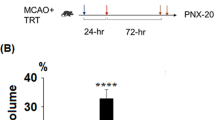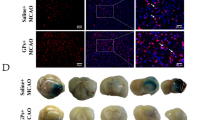Abstract
Evidence suggests that microglia/macrophages can change their phenotype to M1 or M2 and participate in tissue damage or repair. Berberine (BBR) has shown promise in experimental stroke models, but its effects on microglial polarization and long-term recovery after stroke are elusive. Here, we investigated the effects of BBR on angiogenesis and microglial polarization through AMPK signaling after stroke. In the present study, C57BL/6 mice were subjected to transient middle cerebral artery occlusion (tMCAO), intragastrically administrated with BBR at 50 mg/kg/day. Neo-angiogenesis was observed by 68Ga-NODAGA-RGD micro-PET/CT and immunohistochemistry. Immunofluorescent staining further exhibited an increase of M2 microglia and a reduction of M1 microglia at 14 days after stroke. In vitro studies, the lipopolysaccharide (LPS)-induced BV2 microglial cells were used to confirm the AMPK activation effect of BBR. RT-PCR, Flow cytometry, and ELISA all demonstrated that BBR could inhibit M1 polarization and promote M2 polarization. Furthermore, treatment of human umbilical vein endothelial cells (HUVEC) with conditioned media collected from BBR-treated BV2 cells promoted angiogenesis. All effects stated above were reversed by AMPK inhibitor (Compound C) and AMPK siRNA. In conclusion, BBR treatment improves functional recovery and promotes angiogenesis following tMCAO via AMPK-dependent microglial M2 polarization.











Similar content being viewed by others
Abbreviations
- BBR:
-
Berberine
- tMCAO:
-
Transient middle cerebral artery occlusion
- HUVEC:
-
Human umbilical vein endothelial cell
- LPS:
-
Lipopolysaccharide
- CI/RI:
-
Cerebral ischemia and reperfusion injury
- CNS:
-
Central nervous system
- AMPK:
-
Adenosine 5’-monophosphate-activated protein kinase
- CCA:
-
Common carotid artery
- ECA:
-
External carotid artery
- ICA:
-
Internal carotid artery
- MCA:
-
Middle cerebral artery
- rCBF:
-
Regional cerebral blood flow
- TTC:
-
2,3,5-Triphenyltetrazolium chloride
- HE:
-
Hematoxylin eosin
- OSEM3D:
-
3-Dimensional ordered subset expectation maximization algorithm
- DMSO:
-
Dimethyl sulfoxide
- PBS:
-
Phosphate-buffered saline
- PVDF:
-
Polyvinylidene difluoride
- TBST:
-
TBS-Tween20
- DM:
-
Conditioned medium
- LKB1:
-
Liver kinase B1
- CaMKKβ:
-
Calcium/calmodulin‐dependent protein kinase kinase beta
- PPARγ:
-
Peroxisome proliferator-activated receptor γ
References
Chen G, Liu S, Pan R, Li G et al (2018) Curcumin attenuates gp120-induced microglial inflammation by inhibiting autophagy via the PI3K pathway. Cell Mol Neurobiol 38(8):1465–1477
Ganta VC, Choi MH, Kutateladze A, Fox TE et al (2017) A MicroRNA93-interferon regulatory factor-9-immunoresponsive gene-1-itaconic acid pathway modulates M2-like macrophage polarization to revascularize ischemic muscle. Circulation 135(24):2403–2425
Hanisch UK, Kettenmann H (2007) Microglia: active sensor and versatile effector cells in the normal and pathologic brain. Nat Neurosci 10(11):1387–1394
Haubner R, Finkenstedt A, Stegmayr A, Rangger C et al (2016) [68 Ga]NODAGA-RGD—metabolic stability, biodistribution, and dosimetry data from patients with hepatocellular carcinoma and liver cirrhosis. Eur J Nucl Med Mol Imaging 43(11):2005–2013
Hu X, Li P, Guo Y, Wang H et al (2012) Microglia/macrophage polarization dynamics reveal novel mechanism of injury expansion after focal cerebral ischemia. Stroke 43(11):3063–3070
Hu X, Leak RK, Shi Y, Suenaga J et al (2014) Microglial and macrophage polarization—new prospects for brain repair. Nat Rev Neurol 11(1):56–64
Huang H, Huang Q, Wang F, Milner R et al (2016) Cerebral ischemia-induced angiogenesis is dependent on tumor necrosis factor receptor 1-mediated upregulation of α5β1 and αVβ3 integrins. J Neuroinflammation 13(1):227
Jetten N, Verbruggen S, Gijbels MJ, Post MJ, De Winther MP, Donners MM (2014) Anti-inflammatory M2, but not pro-inflammatory M1 macrophages promote angiogenesis in vivo. Angiogenesis 17(1):109–118
Ji J, Xue TF, Guo XD, Yang J et al (2018) Antagonizing peroxisome proliferator-activated receptor gamma facilitates M1-to-M2 shift of microglia by enhancing autophagy via the LKB1-AMPK signaling pathway. Aging Cell 17(4):e12774
Jiang M, Wang H, Jin M, Yang X et al (2018) Exosomes from MiR-30d-5p-ADSCs reverse acute ischemic stroke-induced, autophagy-mediated brain injury by promoting M2 microglial/macrophage polarization. Cell Physiol Biochem 47(2):864–878
Jin Q, Cheng J, Liu Y, Wu J et al (2014) Improvement of functional recovery by chronic metformin treatment is associated with enhanced alternative activation of microglia/macrophages and increased angiogenesis and neurogenesis following experimental stroke. Brain Behav Immun 40:131–142
Kabba JA, Xu Y, Christian H, Ruan W et al (2018) Microglia: housekeeper of the central nervous system. Cell Mol Neurobiol 38(1):53–71
Krupinski J, Kaluza J, Kumar P, Kumar S et al (1994) Role of angiogenesis in patients with cerebral ischemic stroke. Stroke 25(9):1794–1798
Lambertsen KL, Biber K, Finsen B (2012) Inflammatory cytokines in experimental and human stroke. J Cereb Blood Flow Metab 32(9):1677–1698
Li C, Zhang C, Zhou H, Feng Y et al (2018a) Inhibitory effects of betulinic acid on LPS-induced neuroinflammation involve M2 microglial polarization via CaMKKβ-dependent AMPK activation. Front Mol Neurosci 11:98
Li H, Liao Y, Gao L, Zhuang T et al (2018b) Coronary serum exosomes derived from patients with myocardial ischemia regulate angiogenesis through the miR-939-mediated nitric oxide signaling pathway. Theranostics 8(8):2079–2093
Lin X, Zhang N (2018) Berberine: pathways to protect neurons. Phytother Res 32(8):1501–1510
Lin H-Y, Huang B-R, Yeh W-L, Lee C-H et al (2014) Antineuroinflammatory effects of lycopene via activation of adenosine monophosphate-activated protein kinase-α1/heme oxygenase-1 pathways. Neurobiol Aging 35(1):191–202
Liu J, Wang Y, Akamatsu Y, Lee CC et al (2014) Vascular remodeling after ischemic stroke: mechanisms and therapeutic potentials. Prog Neurobiol 115:138–156
Liu Z, Ran Y, Huang S, Wen S et al (2017) Curcumin protects against ischemic stroke by titrating microglia/macrophage polarization. Front Aging Neurosci 9:233
Liu X, Wen S, Yan F, Liu K et al (2018) Salidroside provides neuroprotection by modulating microglial polarization after cerebral ischemia. J Neuroinflammation 15(1):39
Livak KJ, Schmittgen TD (2001) Analysis of relative gene expression data using real-time quantitative PCR and the 2(-Delta Delta C(T)) Method. Methods 25(4):402–408
Longa EZ, Weinstein PR, Carlson S, Cummins R (1989) Reversible middle cerebral artery occlusion without craniectomy in rats. Stroke 20(1):84–91
Lu D-Y, Tang C-H, Chen Y-H, Wei IH (2010) Berberine suppresses neuroinflammatory responses through AMP-activated protein kinase activation in BV-2 microglia. J Cell Biochem 110(3):697–705
Madelaine R, Sloan SA, Huber N, Notwell JH et al (2017) MicroRNA-9 couples brain neurogenesis and angiogenesis. Cell Rep 20(7):1533–1542
Manavski Y, Lucas T, Glaser SF, Dorsheimer L et al (2018) Clonal expansion of endothelial cells contributes to ischemia-induced neovascularization. Circ Res 122(5):670–677
Pan J, Jin JL, Ge HM, Yin KL et al (2015) Malibatol A regulates microglia M1/M2 polarization in experimental stroke in a PPARgamma-dependent manner. J Neuroinflammation 12:51
Sag D, Carling D, Stout RD, Suttles J (2008) Adenosine 5′-monophosphate-activated protein kinase promotes macrophage polarization to an anti-inflammatory functional phenotype. J Immunol 181(12):8633–8641
Sekar P, Huang DY, Hsieh SL, Chang SF et al (2018) AMPK-dependent and independent actions of P2X7 in regulation of mitochondrial and lysosomal functions in microglia. Cell Commun Signal 16(1):83
Seto SW, Chang D, Jenkins A, Bensoussan A et al (2016) Angiogenesis in ischemic stroke and angiogenic effects of Chinese herbal medicine. J Clin Med 5(6):56
Shu S, Zhang L, Zhu YC, Li F et al (2017) Imaging angiogenesis using (68)Ga-NOTA-PRGD2 positron emission tomography/computed tomography in patients with severe intracranial atherosclerotic disease. J Cereb Blood Flow Metab 37(10):3401–3408
Sohn E, Kim Y, Lim H-S, Kim B-Y et al (2019) Hwangryunhaedok-tang exerts neuropreventive effect on memory impairment by reducing cholinergic system dysfunction and inflammatory response in a vascular dementia rat model. Molecules 24(2):343
Suarez-Lopez L, Sriram G, Kong YW, Morandell S et al (2018) MK2 contributes to tumor progression by promoting M2 macrophage polarization and tumor angiogenesis. Proc Natl Acad Sci USA 115(18):E4236–E4244
Suenaga J, Hu X, Pu H, Shi Y, Hassan SH, Xu M, Leak RK, Stetler RA, Gao Y, Chen J (2015) White matter injury and microglia/macrophage polarization are strongly linked with age-related long-term deficits in neurological function after stroke. Exp Neurol 1(272):109–119
Thakkar R, Wang R, Wang J, Vadlamudi RK et al (2018) 17β-Estradiol regulates microglia activation and polarization in the hippocampus following global cerebral ischemia. Oxid Med Cell Longev 2018:4248526
Van Der Gucht A, Pomoni A, Jreige M, Allemann P et al (2016) 68 Ga-NODAGA-RGDyK PET/CT imaging in esophageal cancer. Clin Nucl Med 41(11):e491–e492
Wang Y, Huang Y, Xu Y, Ruan W, Wang H, Zhang Y, Saavedra JM, Zhang L, Huang Z, Pang T (2018) A dual AMPK/Nrf2 activator reduces brain inflammation after stroke by enhancing microglia M2 polarization. Antioxid Redox Signal 28(2):141–163
Xiang B, Xiao C, Shen T, Li X (2018) Anti-inflammatory effects of anisalcohol on lipopolysaccharide-stimulated BV2 microglia via selective modulation of microglia polarization and down-regulation of NF-κB p65 and JNK activation. Mol Immunol 95:39–46
Xiong X-Y, Liu L, Yang Q-W (2016) Functions and mechanisms of microglia/macrophages in neuroinflammation and neurogenesis after stroke. Prog Neurobiol 142:23–44
Yang Y, Liu H, Zhang H, Ye Q et al (2017) ST2/IL-33-dependent microglial response limits acute ischemic brain injury. J Neurosci 37(18):4692–4704
Yang J, Yan H, Li S, Zhang M (2018) Berberine ameliorates MCAO induced cerebral ischemia/reperfusion injury via activation of the BDNF-TrkB-PI3K/Akt signaling pathway. Neurochem Res 43(3):702–710
Yazawa T, Inaoka Y, Okada R, Mizutani T et al (2010) PPAR-γ coactivator-1α regulates progesterone production in ovarian granulosa cells with SF-1 and LRH-1. Mol Endocrinol 24(3):485–496
Y-C Wang, Dzyubenko E, Sanchez-Mendoza EH, Sardari M et al (2018) Postacute delivery of GABAa α5 antagonist promotes postischemic neurological recovery and peri-infarct brain remodeling. Stroke 49(10):2495–2503
Zhang Q, Bian H, Guo L, Zhu H (2016) Pharmacologic preconditioning with berberine attenuating ischemia-induced apoptosis and promoting autophagy in neuron. Am J Transl Res 8(2):1197–1207
Zhang J, Wang C, Shi H, Wu D et al (2018) Extracellular degradation into adenosine and the activities of adenosine kinase and AMPK mediate extracellular NAD + -produced increases in the adenylate pool of BV2 microglia under basal conditions. Front Cell Neurosci 12:343
Zhu J-r Lu, H-d Guo C, W-r Fang et al (2018) Berberine attenuates ischemia–reperfusion injury through inhibiting HMGB1 release and NF-κB nuclear translocation. Acta Pharmacol Sin 39:1706–1715
Acknowledgements
This work was supported by the National Nature Science Foundation of China (Grant No. 81773987 to YZ), Program of Nanjing Health and Family Planning Commission (YKK188107), and Hospital Pharmaceutical Research Program of Nanjing Pharmaceutical Commission (2017YX001). We would like to thank Prof. Hongguang Xie (Nanjing First Hospital) and Dr. Bangshun He (Nanjing First Hospital) for their informative advice.
Author information
Authors and Affiliations
Contributions
All authors listed contributed immensely to this study. YZ, YL, and JZ conceived and designed the study. DC, CG, and ML performed the experiments. JW, JZ, FW, and YZ analyzed the data. JZ and DC wrote the paper. YZ, WF, and YL reviewed and edited the manuscript. All authors read and approved the final version of the manuscript.
Corresponding authors
Ethics declarations
Conflict of interest
The authors declare that there are no competing interests.
Additional information
Publisher's Note
Springer Nature remains neutral with regard to jurisdictional claims in published maps and institutional affiliations.
Rights and permissions
About this article
Cite this article
Zhu, J., Cao, D., Guo, C. et al. Berberine Facilitates Angiogenesis Against Ischemic Stroke Through Modulating Microglial Polarization via AMPK Signaling. Cell Mol Neurobiol 39, 751–768 (2019). https://doi.org/10.1007/s10571-019-00675-7
Received:
Accepted:
Published:
Issue Date:
DOI: https://doi.org/10.1007/s10571-019-00675-7




